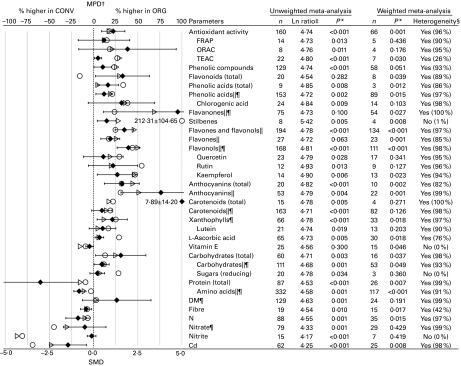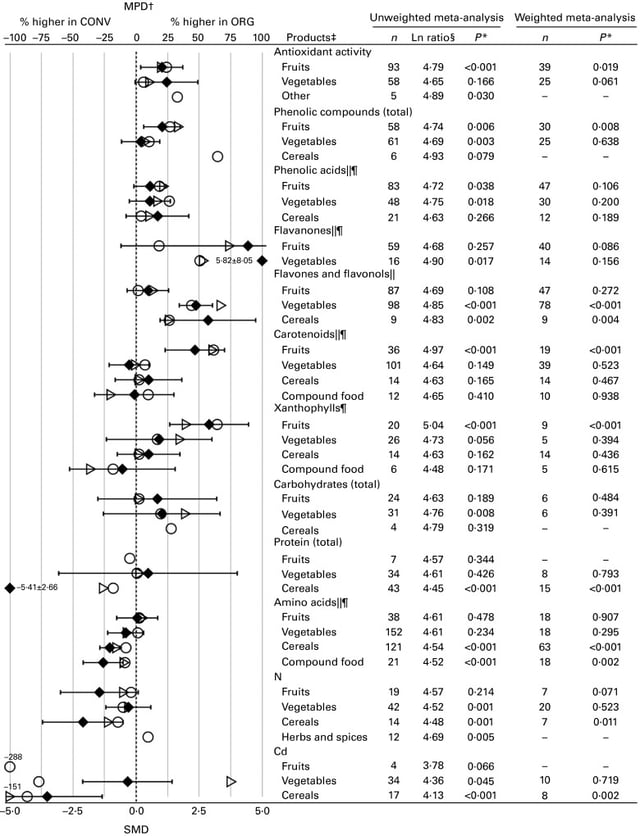TL;DR - Organic foods don't seem to have a significant difference as of what studies can prove, which is why conventional or organic, people should make sure they're getting the proper nutrients that their bodies need.
Brief History of Pesticide Usage
The first recorded use of insecticides is about 4500 years ago by Sumerians who used sulphur compounds to control insects and mites, whilst about 3200 years ago the Chinese were using mercury and arsenical compounds for controlling body lice. In the 1920s there were even cases of using arsenic, which was replaced by DDT usage until the new chemical was discovered to have severe consequences (harm to non-target plants and animals as well as problems with residues). DDT is linked with cancer, endocrine disruption, and reproductive and developmental effects. Over time, people began to switch to organic pesticides to get away from the health scares (or threats) of these synthetic chemicals.
To address the question, we should first be clear about what organic means.
Regarding produce:
Contrary to what most people believe, "organic" does not automatically mean "pesticide-free" or "chemical-free" ... it means that these pesticides, if used, must be derived from natural sources, not synthetically manufactured.
Regarding Farmed Meats (some of the key requirements):
- Must be raised organically on certified organic land
- Must be fed certified organic feed
- No antibiotics or added growth hormones are allowed*
- Must have outdoor access
Organic food covers a wide variety of techniques and different types of foods that all have their own types of legal loop-holes, or possible work-around strategies.
There are many pesticides that are naturally produced by plants which farmers use, but that doesn't mean they aren't dangerous. In contrast, just because a pesticide is synthetic doesn't immediately indicate that it's more dangerous than natural products. Some pesticides that are approved by the government may be harmless in small quantities, but when organic producers attempt to refuse these, they may turn to alternatives that are even more dangerous, just to keep the label "organic".
In another case, farmers could claim "natural methods are insufficient to address critical issues of production", and then treat their animals with antibiotics while still calling the meat organic.
On the other side of this issue, some people argue that the less chemicals we consume in general, the better. Even if they might be government approved, that doesn't prove they're completely non-toxic.
The Stanford paper claim that there just isn't enough evidence to prove a significant difference in health benefits/risks. They don't necessarily have more nutrients, decrease the risk of any diseases, or have higher nutritional content except for phosphorus, which most people get enough of anyways. However, the study does suggest organic foods contain less pesticides. The health risks of consuming less pesticides though, are still contested. "Additionally, organic chicken and pork appeared to reduce exposure to antibiotic-resistant bacteria, but the clinical significance of this is also unclear."
Well what about taste?
Taste is to a large extent subjective. Add to that
different varieties, different weather conditions, different soil
types and different soil management practices...
- Does Organically Grown Food Taste Better?
It's nearly impossible to give a definitive answer of which tastes better. To pile onto the confusion, it's possible that the taste differences touted by some may simply derive from a "health halo".
Genetically Modified Organisms
In response to the scares involved with pesticides in general, people began to research methods to minimize the amount of pesticide used. Basically, DNA from an external source is inserted into a plant so that the plant inherits some desirable traits. This allowed plants to develop natural immunities to certain bacteria and produce more or bigger produce. Over time, people became scared of GMOs as too good to be true. For the most part, scientists agree that GMOs pose no greater risk than conventional food (Expert evaluations from Europe found no verifiable toxic or deleterious effects from GM foods and crops). There are still legitimate concerns about using GMOs, such as allergy development in humans, toxicity levels of naturally produced pesticides in the plant, and antibiotic resistance of bacteria, but for the most part these are tested before distribution. Public wariness may be influenced by labels and commercialism.
Secondary Effects of Organic Farming
Organic farming is good for the environment in the sense that it often leads to less pollution. Pesticides on crops often run-off into streams and rivers, interfering and even hurting local wildlife, but with organic pesticides, the chemicals decompose faster before they can cause massive change to their environment. There may be other potential benefits, but to feed the immense population that exists on earth, many debate whether organic farming is truly sustainable.
"Healthier" depends on the context of the food:
How much pesticide is being used? How much exposure becomes a detriment? Does it have long-term consequences? What are the loopholes that producers are using?
So when you say "organic" and "conventional" it really depends on the process, producer, and product- all of which need to be studied in more detail to develop solid claims.
Citations:
History of Pesticides:
GMOs
Secondary Effects of Organic Farming:
Modern Pesticide Usage:

